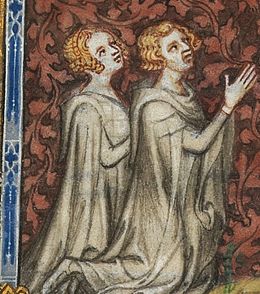Jutta of Bohemia
| Bonne of Luxembourg | |
|---|---|
| Duchess of Normandy | |

Bonne of Luxembourg with her husband
|
|
| Reign | 1332-1349 |
| Born | 20 May 1315 Prague, Bohemia |
| Died | 11 September 1349 (aged 34) Maubuisson, France |
| Burial | Maubuisson Abbey, France |
| Spouse | John II, King of France |
| Issue |
Charles V, King of France Louis I, Duke of Anjou John, Duke of Berry Philip II, Duke of Burgundy Joan, Queen of Navarre Marie, Duchess of Bar Isabella, Lady of Milan |
| House | Luxembourg |
| Father | John, King of Bohemia |
| Mother | Elizabeth of Bohemia |
Bonne of Luxemburg or Jutta of Luxemburg (20 May 1315 – 11 September 1349), was born Jutta (Judith), the second daughter of John the Blind, king of Bohemia, and his first wife, Elisabeth of Bohemia. She was the first wife of King John II of France; however, as she died a year prior to his accession, she was never a French queen. Jutta was referred to in French historiography as Bonne de Luxembourg. She was a member of the House of Luxembourg. Among her children were Charles V of France, Philip II, Duke of Burgundy, and Joan, Queen of Navarre.
In 1326, Jutta was originally betrothed to Henry of Bar; however this arrangement was broken and she stayed at the abbey of Saint-Esprit until her marriage to John, Duke of Normandy.
Jutta was married to John, Duke of Normandy on 28 July 1332 at the church of Notre-Dame in Melun. She was 17 years old, and the future king was 13. Her name Jutta (or Guta), translatable into English as Good (in the feminine case), was changed by the time of her marriage to Bonne (French) or Bona (Latin). Upon marriage, Bonne was the wife of the heir to the French throne, becoming Duchess of Normandy, and Countess of Anjou and of Maine. The wedding was celebrated in the presence of six thousand guests. The festivities were prolonged by a further two months when the young groom was finally knighted at the cathedral of Notre-Dame in Paris. John was solemnly granted the arms of a knight in front of a prestigious audience bringing together the kings of Bohemia and Navarre, and the dukes of Burgundy, Lorraine and the Brabant.
...
Wikipedia
